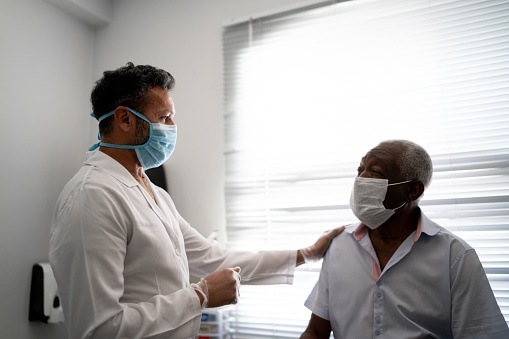
Postoperative Cancer Mortality Is Declining, But Racial Disparities Are Not Changing
A study found that while mortality rates after cancer surgery are on the decline, the racial gap between Black and White patients is not narrowing.
Advertisement
“Black US residents have higher rates of mortality for most of the 15 leading causes of death in the US, including cancer, which is the second highest cause of death. In addition, Black patients face more challenges related to cancer care and treatment as they are more likely to receive their cancer diagnoses at more advanced stages than White patients and have higher rates of mortality following cancer surgery,” the authors of the study wrote.
https://www.docwirenews.com/hematology-oncology/postoperative-cancer-mortality-is-declining-but-racial-disparities-are-not-changing/
–
ASH 2020: ZUMA-12 Study Assesses CAR T-Cell Therapy as Frontline Treatment for Large B-Cell Lymphoma
Sattva S. Neelapu, MD, of the University of Texas MD Anderson Cancer Center in Houston, TX, discusses outcomes from the phase II ZUMA-12 study, which assessed the CAR T-cell therapy axicabtagene ciloleucel (axi-cel) as first-line treatment for patients with large B-cell lymphoma.
https://www.docwirenews.com/docwire-pick/ash-2020-zuma-12-study-assesses-car-t-cell-therapy-as-frontline-treatment-for-large-b-cell-lymphoma/
–
ASH 2020: GPRC5D Is a New Target of Interest for Multiple Myeloma
Ajai Chari, MD, PhD, of Mount Sinai Medical Center in New York, NY, discusses findings from a phase I study of the novel agent talquetamab, a first-in-class bispecific antibody that binds to GPRC5D and CD3, for the treatment of relapsed/refractory multiple myeloma.
https://www.docwirenews.com/docwire-pick/ash-2020-gprc5d-is-a-new-target-of-interest-for-multiple-myeloma/
–
GoFund Who? These Are The Cancer Patients Who Really Benefit from Crowdfunding Campaigns
While likely well-intentioned, the use of crowdfunding campaigns for cancer care may not actually benefit the patients with the most significant economic need, new research suggests.
In fact, the study authors concluded, “By rewarding those with existing socioeconomic advantage, cancer crowdfunding may perpetuate socioeconomic disparities in cancer care access. The findings also underscore the widespread nature of financial toxicity resulting from cancer care.”
https://www.docwirenews.com/hematology-oncology/gofund-who-these-are-the-cancer-patients-who-really-benefit-from-crowdfunding-campaigns/
A study found that while mortality rates after cancer surgery are on the decline, the racial gap between Black and White patients is not narrowing.
“Black US residents have higher rates of mortality for most of the 15 leading causes of death in the US, including cancer, which is the second highest cause of death. In addition, Black patients face more challenges related to cancer care and treatment as they are more likely to receive their cancer diagnoses at more advanced stages than White patients and have higher rates of mortality following cancer surgery,” the authors of the study wrote.
https://www.docwirenews.com/hematology-oncology/postoperative-cancer-mortality-is-declining-but-racial-disparities-are-not-changing/
–
ASH 2020: ZUMA-12 Study Assesses CAR T-Cell Therapy as Frontline Treatment for Large B-Cell Lymphoma
Sattva S. Neelapu, MD, of the University of Texas MD Anderson Cancer Center in Houston, TX, discusses outcomes from the phase II ZUMA-12 study, which assessed the CAR T-cell therapy axicabtagene ciloleucel (axi-cel) as first-line treatment for patients with large B-cell lymphoma.
https://www.docwirenews.com/docwire-pick/ash-2020-zuma-12-study-assesses-car-t-cell-therapy-as-frontline-treatment-for-large-b-cell-lymphoma/
ASH 2020: GPRC5D Is a New Target of Interest for Multiple Myeloma
Ajai Chari, MD, PhD, of Mount Sinai Medical Center in New York, NY, discusses findings from a phase I study of the novel agent talquetamab, a first-in-class bispecific antibody that binds to GPRC5D and CD3, for the treatment of relapsed/refractory multiple myeloma.
https://www.docwirenews.com/docwire-pick/ash-2020-gprc5d-is-a-new-target-of-interest-for-multiple-myeloma/
–
GoFund Who? These Are The Cancer Patients Who Really Benefit from Crowdfunding Campaigns
While likely well-intentioned, the use of crowdfunding campaigns for cancer care may not actually benefit the patients with the most significant economic need, new research suggests.
In fact, the study authors concluded, “By rewarding those with existing socioeconomic advantage, cancer crowdfunding may perpetuate socioeconomic disparities in cancer care access. The findings also underscore the widespread nature of financial toxicity resulting from cancer care.”
https://www.docwirenews.com/hematology-oncology/gofund-who-these-are-the-cancer-patients-who-really-benefit-from-crowdfunding-campaigns/







 © 2025 Mashup Media, LLC, a Formedics Property. All Rights Reserved.
© 2025 Mashup Media, LLC, a Formedics Property. All Rights Reserved.